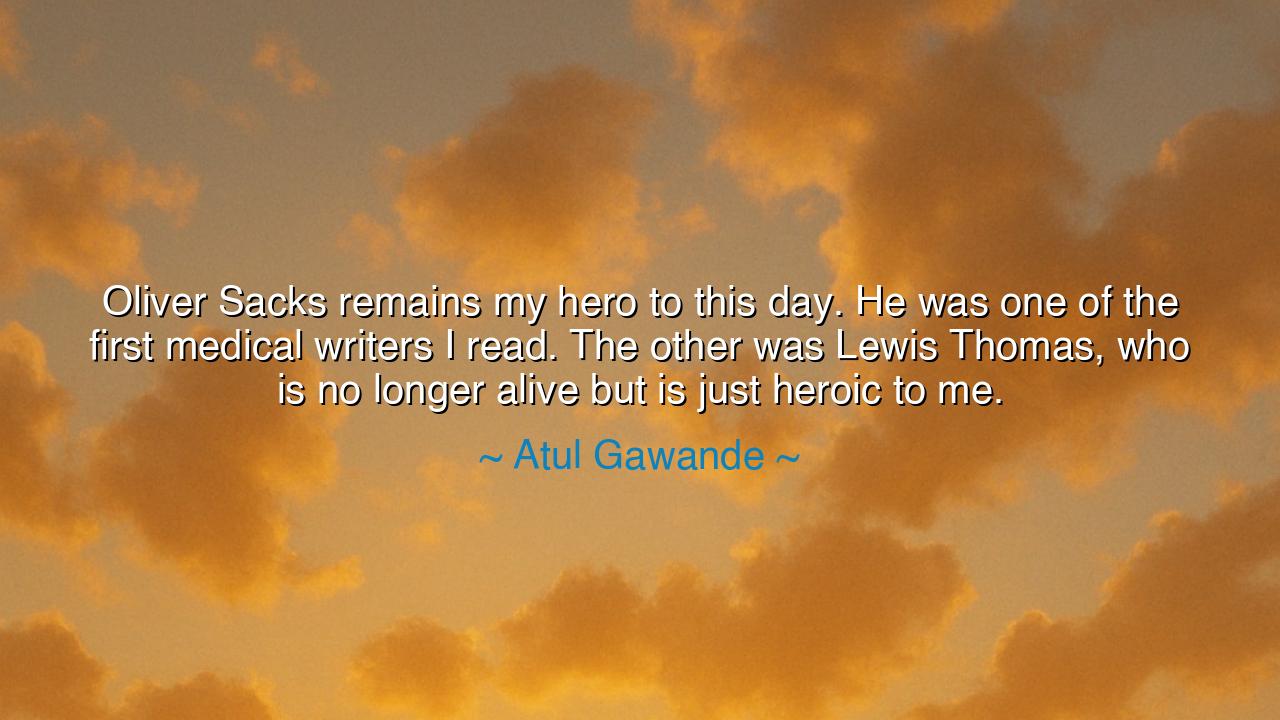
Oliver Sacks remains my hero to this day. He was one of the first
Oliver Sacks remains my hero to this day. He was one of the first medical writers I read. The other was Lewis Thomas, who is no longer alive but is just heroic to me.






In the words of Atul Gawande, “Oliver Sacks remains my hero to this day. He was one of the first medical writers I read. The other was Lewis Thomas, who is no longer alive but is just heroic to me,” we hear not merely an expression of admiration, but a confession of lineage — the spiritual lineage of healers who write, and writers who heal. These words carry the fragrance of reverence, the kind that one master might offer to another across the centuries. For in every generation, there are those who stand as beacons of understanding, bridging the mystery of the body with the poetry of the soul. To Gawande, Sacks and Thomas were such men — not merely physicians, but philosophers of compassion, who saw in illness not just affliction, but the deep humanness of being alive.
The origin of this quote lies in Gawande’s own journey — a surgeon who found meaning not only in the precision of the scalpel, but in the art of reflection. In his early years, when he first encountered the writings of Oliver Sacks, he met a physician who looked beyond the diagnosis and into the narrative of the patient. Sacks, in works like The Man Who Mistook His Wife for a Hat, revealed that medicine is not simply science, but storytelling — a way to illuminate the fragile beauty of consciousness. Likewise, Lewis Thomas, author of The Lives of a Cell, wrote of humanity’s connection to the natural world with awe and humility, reminding the healers of the world that their duty was not dominion, but understanding. In these men, Gawande saw what every great healer must one day see: that medicine without empathy is a hollow craft.
In the style of the ancients, we may say that these heroes of the pen and stethoscope are akin to the sages of old — those who sought wisdom not only through experience, but through contemplation. Just as Hippocrates once declared that “wherever the art of medicine is loved, there is also a love of humanity,” so too did Sacks and Thomas embody this truth. They practiced medicine not as a profession, but as a vocation of wonder. Their writings were not meant to impress, but to awaken — to remind us that every human body carries a story, every disease a lesson, every cure an act of faith. And so, when Gawande calls them “heroic,” he honors that sacred calling: the courage to see humanity in its suffering and speak of it with tenderness.
There is a noble tradition among healers who write — from Maimonides, the philosopher-physician of Andalusia, to Chekhov, the Russian doctor who turned the pain of his patients into timeless literature. Each of them understood that to write about the human condition is another form of healing — not of the flesh, but of the soul. Oliver Sacks carried this mantle in the modern age, chronicling the strange and miraculous stories of his patients not as curiosities, but as mirrors of our shared vulnerability. Lewis Thomas, in turn, saw the poetry within the cell, teaching that even the smallest parts of us sing in harmony with the universe. Their heroism, as Gawande recognized, was quiet yet profound — born not of conquest, but of connection.
To call another man “hero” is to acknowledge that your own path was lit by his flame. Gawande’s reverence reflects the ancient truth that wisdom is not self-born; it is inherited, cultivated, and passed onward like fire from one lamp to another. Every generation of physicians inherits the moral task of transforming knowledge into mercy, and writers like Sacks and Thomas show how this can be done. Through their examples, Gawande reminds us that the greatest heroes are not those who save thousands in a single moment, but those who illuminate the dignity of a single human being and, by doing so, save the meaning of medicine itself.
Consider the story of Dr. Sacks himself, who once treated a man rendered frozen by encephalitis — a man who awoke, after decades of silence, to hear music once more. Sacks did not record this as a case study but as a parable of resurrection. He saw in it a testament to endurance, to the mystery that even when the body falters, the spirit waits to be called forth. It is this way of seeing — with both science and soul — that Gawande reveres. For every doctor who reads Sacks or Thomas learns that medicine is not only about life and death, but about meaning.
From this reflection arises a lesson for all who seek to serve: find heroes who awaken your humanity. Read not only to learn, but to feel. Follow those whose words remind you why you began your work in the first place. Whether you heal bodies, build bridges, or teach minds, let your craft be guided by empathy, and your intellect tempered by wonder. The ancients taught that knowledge without virtue leads to ruin — but knowledge infused with compassion leads to light. As Gawande honors his heroes, so too must we honor ours: by carrying forward their wisdom, by healing with both hands and heart, and by writing the next verse in the eternal song of human understanding.






AAdministratorAdministrator
Welcome, honored guests. Please leave a comment, we will respond soon